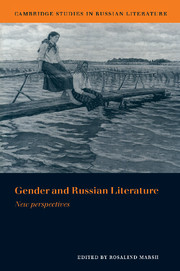Book contents
- Frontmatter
- Contents
- Notes on contributors
- Acknowledgements
- 1 Introduction: new perspectives on women and gender in Russian literature
- PART I HISTORICAL AND BIOGRAPHICAL PERSPECTIVES
- 2 Women in seventeenth-century Russian literature
- 3 Conflicts over gender and status in early nineteenth-century Russian literature: the case of Anna Bunina and her poem Padenie Faetona
- 4 Reading the future: women and fortune-telling in Russia (1770–1840)
- 5 Russian women writers of the nineteenth century
- 6 The ‘woman question’ of the 1860s, and the ambiguity of the ‘learned woman’
- 7 Carving out a career: women prose writers, 1885–1917, the biographical background
- 8 The fate of women writers in literature at the beginning of the twentieth century: ‘A. Mirè’, Anna Mar, Lidiia Zinov′eva-Annibal
- 9 Lidiia Zinov′eva-Annibal's The Singing Ass: a woman's view of men and Eros
- 10 Anastasiia Verbitskaia reconsidered
- 11 Soviet woman of the 1980s: self-portrait in poetry
- PART II THE PERSPECTIVE OF LITERARY CRITICISM
- Index
- CAMBRIDGE STUDIES IN RUSSIAN LITERATURE
7 - Carving out a career: women prose writers, 1885–1917, the biographical background
Published online by Cambridge University Press: 06 July 2010
- Frontmatter
- Contents
- Notes on contributors
- Acknowledgements
- 1 Introduction: new perspectives on women and gender in Russian literature
- PART I HISTORICAL AND BIOGRAPHICAL PERSPECTIVES
- 2 Women in seventeenth-century Russian literature
- 3 Conflicts over gender and status in early nineteenth-century Russian literature: the case of Anna Bunina and her poem Padenie Faetona
- 4 Reading the future: women and fortune-telling in Russia (1770–1840)
- 5 Russian women writers of the nineteenth century
- 6 The ‘woman question’ of the 1860s, and the ambiguity of the ‘learned woman’
- 7 Carving out a career: women prose writers, 1885–1917, the biographical background
- 8 The fate of women writers in literature at the beginning of the twentieth century: ‘A. Mirè’, Anna Mar, Lidiia Zinov′eva-Annibal
- 9 Lidiia Zinov′eva-Annibal's The Singing Ass: a woman's view of men and Eros
- 10 Anastasiia Verbitskaia reconsidered
- 11 Soviet woman of the 1980s: self-portrait in poetry
- PART II THE PERSPECTIVE OF LITERARY CRITICISM
- Index
- CAMBRIDGE STUDIES IN RUSSIAN LITERATURE
Summary
By the end of the nineteenth century, Russian women prose writers had established themselves in greater numbers than ever before. There are several reasons for this greater participation. This was the first generation of women to come of age after the initial women's liberation movement of the 1860s; greater educational opportunities, including higher education, were becoming available to women, especially after 1894; after the emancipation of the serfs in 1861, the gradual breakdown of the gentry family structure, which could no longer provide for many of its unmarried young women, forced the latter to look for employment; while many other professions remained closed to women, as did jobs in the government bureaucracy until later in the twentieth century, writing remained an attractive possibility; finally, the advent of modernism in the 1890s, the period of the Silver Age, which promoted artistic creativity as a ‘cause’ worthy of the same degree of devotion as socio-political activity, attracted many women into literature despite the social opprobrium that still accompanied their transgressing traditional roles, as well as the poor pay and high degree of competition. In this essay I shall be exploring some of the conditions that favoured women's entry into literature as well as the obstacles that remained in their way.
- Type
- Chapter
- Information
- Gender and Russian LiteratureNew Perspectives, pp. 129 - 140Publisher: Cambridge University PressPrint publication year: 1996

